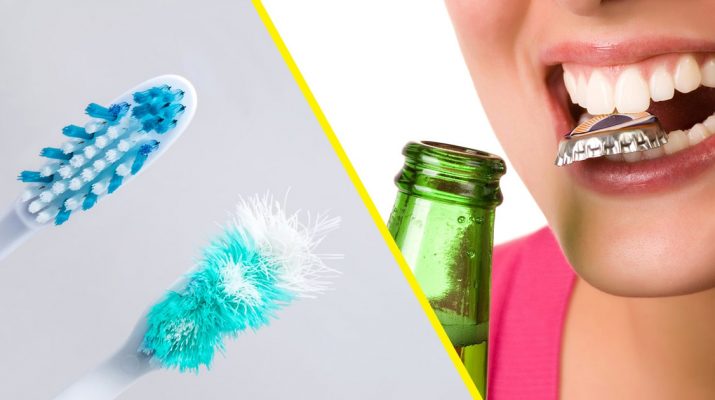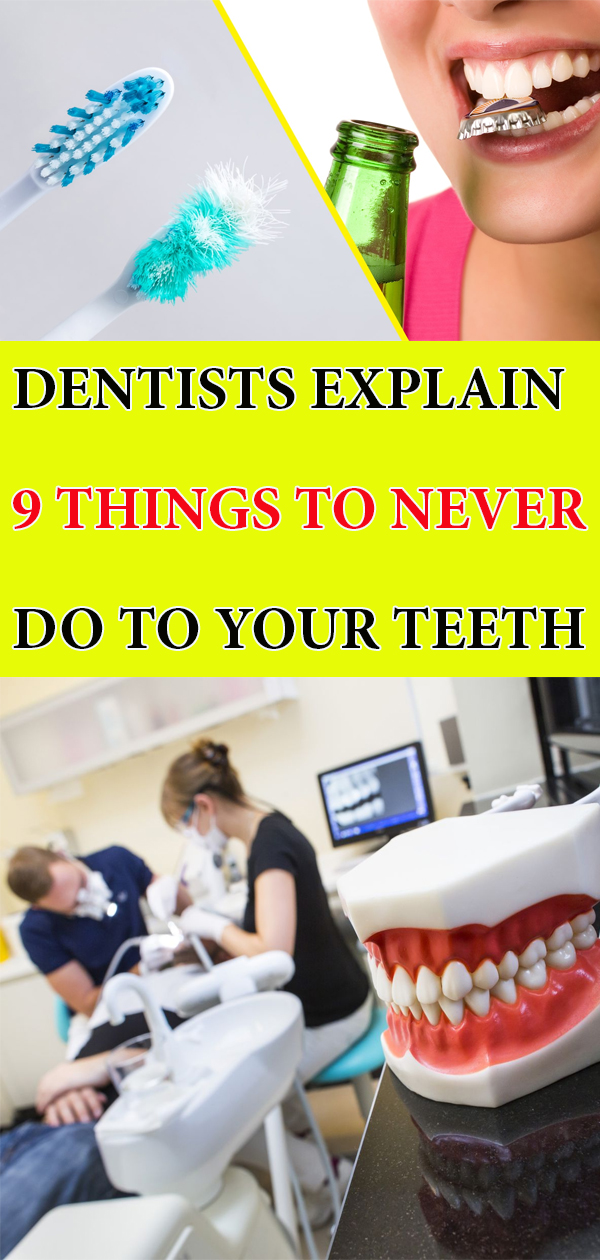Keeping our teeth healthy is crucial to the health of the rest of the body. You likely follow all the rules you know about to keep your dental hygiene up to par. But some people have habits that, without them realizing, have pretty awful effects on teeth.
So how can you ensure that you never treat your teeth so badly? Have you already been ruining your teeth? Luckily, it’s not too late to make a change! Get your positive thinking in gear, because we’re here to help. Here’s how dentists explain some things to never do to your teeth, and why these behaviors are so bad for those pearly whites.
9 Things To Never Do To Your Teeth, According To Dentists
1. Drinking Too Many Dark Drinks
Drinks that are dark in color tend to have lower pH levels. This means they are more acidic and have the potential to badly stain teeth. Drinks with higher pH values, while they do have their problems, are likely to be better. Here are some examples of drinks to steer clear from!
A) Coffee
Coffee is extremely acidic, and its dark hue means that excessive drinking can lead to yellowing. Too much can cause pretty obvious staining. The good news is that a dentist can remove coffee stains more easily than those of other drinks.
B) Red Wine
We all know how stubborn stains from red wine can be. Red wine’s acidity means that it has a very good chance of staining your teeth if you drink an excess of it. This is because of components known as tannins and chromogen, both of which are rich pigments present in red wine.
C) White Wine
Yes, we know white wine is a light drink. But unfortunately, it’s just as acidic as red wine. In fact, the acidity is still bad enough to cause tooth enamel damage, which can make your teeth more susceptible to staining overall.
2. Chewing Ice
According to Richard Price, one of the American Dental Association’s spokespersons and a retired dentist, chewing ice is so bad for you that you might as well be trying to bite through rock.
Ice cubes are very cold and very hard – two features that make them less than ideal for chewing. Teeth are designed to crush onto foods, not against them. Too much of this can do things such as:
- Dislodge fillings
- Chip teeth
- Cause breaks in teeth
On top of all this, this kind of chomping can lead to tissue irritation. Inside each tooth lies soft tissue, and chewing ice can cause them to ache. You may then experience toothaches and heightened sensitivity overall.
3. General Bad Habits
There are a lot of teeth-related bad habits that people take part in. They’re called “bad” for a reason – they can all damage your teeth pretty badly. Here are some habits to avoid.
A) Biting Nails
Nail biting is bad for hygiene and makes your fingernails look bad. But on top of that, it can cause tooth-related damage. Biting nails chronically can cause teeth to slowly shift and move until they are crooked or out of place. Plus, all the dirt under nails can lead to serious oral infections.
B) Sucking Thumbs
Few adults suck their thumbs, but if you do – or you know children who do – it has to stop. Sucking on thumbs can lead to teeth shifting out of place, causing bad misalignment that can only be fixed with braces. Plus, severe misalignment can cause breathing issues and chewing troubles.
C) Grinding Teeth
Known also as bruxism, grinding teeth simply wears them down, so it’s something to never do to your teeth. Unfortunately, it’s a very hard habit to kick. Many people do it reflexively out of stress, and even more do it unconsciously in their sleep – something they can’t control.
Try wearing a mouthguard when you go to bed to prevent grinding at night. You can also try eating more soft foods during the day to make up for any damage.
4. Brushing Incorrectly
There are endless ways that someone can brush their teeth incorrectly. Here’s a list.
A) Brushing Too Hard
Overly vigorous brushing can lead to forceful deteriorating of enamel. It can even cause gum irritation and excessive cold sensitivity. Even worse, ironically, it can cause cavities – which you should never do to your teeth.
B) Brushing After Breakfast, Not Before
The rule is that you should brush your teeth first thing every single morning. This is in order to flush out bacteria that has taken root overnight. Eating first and then brushing doesn’t have the same effect.
C) Brushing Straight After Meals
You might think that hurrying to the bathroom with a toothbrush in hand after every meal is a good option, but it really isn’t. You want to give your saliva a chance to dissolve the food first.
If you’ve consumed acidic foods or acidic drinks, your teeth will be sensitive and immediately brushing can damage them. Wait about 45 minutes before brushing your teeth.
D) Using Unprotected Toothbrushes
If you store your toothbrush out in the open with everyone else in your house’s, especially if they’re very close together, bacteria may be jumping from one brush to the next.
Aerosolized waste material from your toilet bowl also has a chance of getting into your brush. Use a toothbrush cover or keep the brush in a closed cabinet instead.
E) Using A Hard Toothbrush
As a rule, you should never use a toothbrush with hard bristles. Medium-soft is typically the way to go for positive results. Overly hard bristles can cause enamel damage, as well as damage to the surfaces of roots and your gums.
F) Rinsing After Brushing
After you have brushed your teeth, rinsing out your mouth thoroughly isn’t the best idea. This will get rid of the extra fluoride left behind by the toothpaste. This fluoride could help strengthen your teeth and fight decay.
5. Eating And Drinking Sugary Things
All dentists will tell you to steer clear of sugar. Mouth bacteria works to dissolve sugar by turning it into acid that can break down enamel and cause decay. For this reason, consuming sugar excessively is one of the top things to never do to your teeth. Here are some of the worst and most unlikely offenders.
A) Gummy Cnady
All candy is fairly bad and will lead to tooth decay in excess, but gummies are by far the worst. This is because they tend to be sticky, thus becoming attached to teeth and keeping the sugar around, which is repeatedly digested into acid for hours on end.
B) Cough Drops
They might count as medicine, but cough drops are typically full of sugar. This sugar, coming off a hard cough drop, does the same thing any hard candy will do: it starts to coat your teeth in a form of plaque. Then, the acid is released, as cavities are incoming.
C) Sodas
Every serving of a soft drink will contain around 11 teaspoons of sugar – certainly not a positive beverage for your body. Thanks to the citric acid and phosphoric acid in sodas, which start to cause enamel to deteriorate, your teeth become even more exposed to sugars and, therefore, acid.
D) Fruit Juice
Fruit juice sounds healthy, thanks to all its antioxidants and high vitamin content. The problem is that these drinks have a ton of sugar in them – sometimes just as much as a fizzy drink has! Opt for juices with no added sugar for best results.
E) Sports Drinks
As refreshing and energizing as these drinks are after workouts and for promoting recovery and positive thinking, they’re often stuffed full of sugar. Water is always a better option!
6. Using Teeth As a Tool
Every now and then, you’ll see someone who shows off a party trick where they use their teeth to open a bottle cap. It might seem cool at the time, but doing things like this could spell big trouble for your teeth.
We get it – using your chompers to tear open plastic packaging seems easy and convenient, but it’s a sure way to make your dentist shake their head and gasp in horror. Your teeth aren’t made to replace scissors or bottle openers; they’re made to chew food that’s much easier to get through!
Using your teeth as a multipurpose tool is a surefire way to land yourself a chip one day. Stick to using the proper tools, and keep your pearly whites safe by sticking to nice, harmless foods.
7. Holding Or Chewing Non-Food Items
Lots of people chew things when they’re nervous, or just out of habit. You might chew a pencil or pen, nibble on the stem of your glasses, or bite something you’re holding out of reflex. This is actually a very bad habit and is something you should never do.
The same goes for just holding items in your teeth so that you have your hands free. For example, you may hold a clip in your mouth while tying your hair. Or, you may bite down on your keys as you fumble for something you’ve misplaced.
In both cases – whether chewing or just holding – there’s a good chance you don’t realize how much force you’re putting on the items in question. According to cosmetic dentist Elisa Mello, this can lead to issues such as:
- Splintered enamel
- Shifting or moving teeth
- Bad jaw alignment
- Chipped or cracked teeth
- Broken dental work
If you really feel the need to chew on something, opt for sugarless gum instead. It can help reduce the compulsion without doing something your teeth aren’t made for.
8. Flossing Wrongly
All dentists tell you to floss – but are you doing so the right way? Here’s the correct way to floss:
- Gently take your floss and pass it in between two teeth.
- Rub gently in an up and down motion around the teeth and the small amount of gum between your teeth.
- Do not floss in a backward and forwards motion. Doing so will cause damage to your pearly whites and gums!
It’s also recommended that you floss your teeth before brushing them. Flossing helps to dislodge stuck food that a toothbrush can’t get to, so it’s kind of like a pre-wash. When you do brush after, you’ll be able to more thoroughly remove excess debris.
9. Snacking Regularly
Saliva works by helping to dissolve and wash away bits of food left behind in your teeth after meals. When you snack throughout the day, you produce saliva more often – but in much smaller amounts.
Grazing regularly throughout the day means you aren’t producing enough saliva each time. This is bad for your chompers, as the food from your snacks that gets stuck isn’t usually washed away.
If you really must snack, stick to raw veggie sticks or unsalted nuts, as both have benefits for your teeth.
Final Thoughts On Some Things To Never Do To Your Teeth
Your adult teeth are the only set you will ever get. That is why taking care of them is so important. Once they’re damaged or gone, that’s it; there’s no getting them back! But if you aren’t aware that you’re causing damage to them, then things get more complicated.
By steering clear of these 9 things dentists say you should never do to your teeth, you’ll ensure that you are truly doing what is best for your dental and oral health. If you have any concerns about your current state of dental health, speak to a dentist. And don’t forget to attend regularly scheduled appointments!



